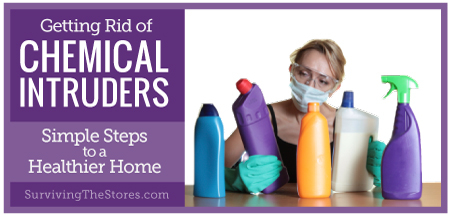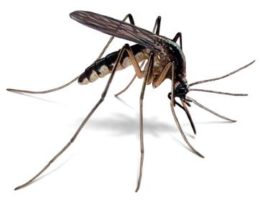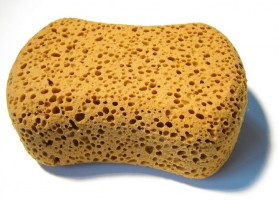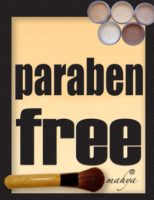
The following is a guest post from Sarah at Renaissance Mama!
Be sure to check all of the Getting Rid Of Chemical Intruders posts!!
 Powerful enough to melt plastic, your mosquito repellent is a neurotoxin! Duke University Medical Center pharmacologist Mohamed Abou-Donia says that exposure to DEET causes neurons to die in several parts of your brain, including areas that control muscle movement, memory, concentration, and learning. Rats exposed to DEET in the lab had trouble walking!
Powerful enough to melt plastic, your mosquito repellent is a neurotoxin! Duke University Medical Center pharmacologist Mohamed Abou-Donia says that exposure to DEET causes neurons to die in several parts of your brain, including areas that control muscle movement, memory, concentration, and learning. Rats exposed to DEET in the lab had trouble walking!
We all hate mosquito bites, and a bite, in some areas of the world, can lead to serious disease and even death. Thankfully, we have natural alternatives to DEET that are proven to be even more effective!
Mosquito repellent isn’t the only product we use that exposes us to nasty chemicals. Your toothpaste, lotions, shampoos, sunscreen, and baby care products also harbor chemicals you don’t want on your skin!
Our Skin – A Sponge
 Did you know that, according to naturopath and skin specialist Ananda Mahony, our skin absorbs up to 60% of whatever is placed on it and that our underarms and other sensitive places, absorb 100%? Artificial fragrances have a 100% absorption rate.
Did you know that, according to naturopath and skin specialist Ananda Mahony, our skin absorbs up to 60% of whatever is placed on it and that our underarms and other sensitive places, absorb 100%? Artificial fragrances have a 100% absorption rate.
With those sorts of absorbance rates, it’s REALLY important to be careful about what we put on our skin.
The BigBadUglies
What sort of toxic chemicals are found in products we might use every day?
Oxybenzone, Zinc Oxide, & Titanium Dioxide
Oxybenzone, Zinc Oxide and Titanium Dioxide are common ingredients in sunscreen that could be more dangerous than we think. While they may block the sun’s rays, Oxybenzone is a known endocrine disruptor that builds up in the body over time. Zinc Oxide and Titanium Dioxide are nano-particles that concern scientists because of their acute ability to penetrate the skin and possibly cause internal damage.
To Avoid: Take Vitamin D! Studies have shown that people who are deficient in Vitamin D burn easier. You can also find natural sunscreens without those ingredients – we really like Badger Products.
Aluminmum
Aluminum is a common ingredient in deodorant and antiperspirant (So common it can be difficult to find one without it!) The World Health Organization says that there is a suspected link between aluminum and Alzheimer’s disease. It has also been linked to brain disorders and is a possible risk factor in breast cancer. Dr. Mercola explains that aluminum works in deodorants by clogging our pores, thus trapping toxins and sweat inside our bodies! These toxins then build up and are trapped in our lymph nodes. This buildup can lead to cell mutations and cancer.
To Avoid: Read ingredient labels closely and avoid any with aluminum as an ingredient. You may try a liquid roll-on like Naturally Fresh. You might also try making your own Cocount Oil Deodorant!
DEET
We’ve already talked about the dangers of DEET in mosquito repellent (see above).
To Avoid: Make your own Mosquito Repellant or use a natural, chemical-free alternative like Dr. Mercola’s Bug Spray (shown to be more effective than 100% DEET!)
Parabens
 Parabens can be found in shampoos, commercial moisturizers, shaving gels, cleansing gels, personal lubricants, topical pharmaceuticals and toothpaste. They also mess with our hormones (it mimics estrogen) and could be linked to a higher incidence of breast cancer. In addition, Dr. S. Oishi of the Department of Toxicology, Tokyo Metropolitan Research Laboratory of Public Health reported that exposure of newborn male mammals to butylparaben “adversely affects the secretion of testosterone and the function of the male reproductive system.”
Parabens can be found in shampoos, commercial moisturizers, shaving gels, cleansing gels, personal lubricants, topical pharmaceuticals and toothpaste. They also mess with our hormones (it mimics estrogen) and could be linked to a higher incidence of breast cancer. In addition, Dr. S. Oishi of the Department of Toxicology, Tokyo Metropolitan Research Laboratory of Public Health reported that exposure of newborn male mammals to butylparaben “adversely affects the secretion of testosterone and the function of the male reproductive system.”
To Avoid: Read labels carefully and only choose paraben-free products.
Sulfates
Sulfates – Sodium Lauryl Sulfate is found in shampoos. During its production, petrochemicals are added and it may retain potentially carcinogenic contaminants. While the amount absorbed each time is small, repeated exposure (every time you take a shower!), creates problems over time. I noticed that my husband’s once-severe dandruff has disappeared since we eliminated SLS from our shampoos. Yay! I was tired of buying expensive dandruff shampoos that didn’t really work!
To Avoid: Choose shampoos that don’t have sulfates in their ingredients! You can even make your own! I like the Whole Foods brand shampoo and conditioner but there are lots of others to choose from. You may also try “No Poo”!
Phthalates
Phthalates – According to Ananda Mahony, phthalates are found in artificial fragrances, deodorant, perfume, nail polish and certain plastic food packaging including articles such as baby bottles. These could be linked to a higher incidence of breast cancer, likely because of the disruption they have on our hormones.
To Avoid:
• The Daily Green tells us to look for the names DBP (di-n-butyl phthalate), DEP (diethyl phthalate),
DMP (dimethyl phthalate).
• Stay away from products that contain “fragrance“, which is used to denote a combination of
compounds, possibly including phthatates.
• Choose plastics with the recycling code 1, 2 or 5. Recycling codes 3 and 7 are more likely to
contain bisphenol A (BPA) or phthalates.
Propylene Glycol
Propylene Glycol is used to keep products from melting or freezing. Its Material Data Sheet (for cleaning up chemical spills) says that it can cause eczema, dermatitis, and allergic reactions as well as kidney and liver problems. It also causes problems with healthy cell growth. Propylene Glycol is found in ALL KINDS of products including hand soap, deodorant, toothpaste, mouthwash (and also as an additive in some pharmaceuticals.)
To Avoid: Choose a natural product that doesn’t use propylene glycol. I’ve found replacements for my toothpaste, deodorant, and hand soap that are all propylene glycol –free.
Tricky, Tricky
As manufacturers catch on to the fact that we as consumers want more natural ingredients, they begin to advertise their products as “All Natural”. It is SO important to note that a natural starting material does not necessarily equal a natural ingredient at the end of the manufacturing process. I know of one large-scale corporation that has begun marketing “plant-based” products. Their materials began as a plant, but once the processing was finished, they had turned it into a toxic chemical! I was so mad to discover that the ”all-natural” products I thought I was buying weren’t that at all! Please read the ingredient labels carefully and research products online to be sure of what you’re using.
To read more, check out The Cosmetic Chemicals Guide: What you ought to Know Before You Buy, by Tamara Laschinsky
 Sarah graduated from Baylor with a major in bioinformatics and is now making that degree work hard by raising her two kiddos and keeping her husband relatively well fed. In her quieter moments, she can be found riding her horse and blogging at Renaissance Mama (though not usually at the same time)
Sarah graduated from Baylor with a major in bioinformatics and is now making that degree work hard by raising her two kiddos and keeping her husband relatively well fed. In her quieter moments, she can be found riding her horse and blogging at Renaissance Mama (though not usually at the same time)Disclaimer: The information on this site is not intended or implied to be a substitute for professional medical advice, diagnosis or treatment. Please confirm any information obtained from or through this web site with other sources, and review all information regarding any medical condition or treatment with your physician. Never disregard professional medical advice or delay seeking medical treatment because of something you have read on this website. This information is not intended to diagnose, treat, or cure any disease.
Leave a Reply